Questions You May Have About Spinal Cord Stimulation
Chronic back pain is complex, and can make you wonder if there is any treatment that will relieve the unrelenting discomfort you live with daily. You’ve been through the gauntlet, trying everything from medications, to injections, to surgery, and nothing has worked. Maybe you’ve heard about Spinal Cord Stimulation (SCS) but still have some questions about whether it is worth considering. The physicians at Innovative Pain & Spine in Lincoln and Omaha, Nebraska are experienced in using SCS to treat patients who suffer with chronic back pain. As pain management physicians, we want to make sure that you have all the information about SCS, a treatment that could possibly change your life.
What is SCS?
Spinal Cord Stimulation uses mid electrical pulses that stimulate the spinal nerves to block or interrupt pain signals sent to the brain. Stimulation doesn’t eliminate the source of pain so the amount of pain relief varies for each person. A small battery-powered device is implanted under the skin that transmits an electrical current to small wires that are placed behind the spinal cord. It is considered a minimally-invasive procedure to implant the device and is done as an outpatient procedure.
Patients who meet the criteria for SCS are given a trial period of one week to test out SCS and find out if they experience pain relief. The device is worn on the outside of the body. If our physicians determine that SCS provides significant relief and the patient wants to move forward with this treatment, the SCS device is then surgically implanted.
Can SCS relieve my pain?
Patients with chronic back pain who have used SCS have reported that they found significant relief from their pain. Approximately 88% of patients experience long-term relief, and many patients are able to do activities again that once were impossible because of their chronic pain. There is no one simple treatment that magically makes your pain go away and that is why we may include other therapies to provide you with a comprehensive approach to your pain management.
The good news is that SCS can help you return to a productive lifestyle with minimal or no pain. Being able to enjoy universal activities like walking, sitting, cooking, working, or spending time with family without constant pain are the most common reasons patients are excited about SCS.
Are there risks with SCS?
As with any medical procedure, there can be risks, but with SCS, major complications are rare. Medical issues most commonly associated with SCS are bleeding at the site of the implant or the patient may experience an infection. Both can be easily treated.
Who is a good candidate for SCS?
There are several indicators that our physicians will take into consideration when determining which patients are the best candidates for SCS, such as if they:
- Have had back surgery, but still experience pain
- Have suffered injuries to the spinal cord or extremities
- Have suffered from arachnoiditis
- Have used medications or therapies that failed to treat their pain
- Have chronic back or neck pain and are not candidates for spine surgery
What is the recovery time?
Patients will usually see full results from SCS within three months, about the time it takes your body to heal from the incision where the spinal cord stimulator was implanted. Additionally, adjustments to the stimulator leads are done during this time.
The most promising aspect about SCS is that while you are healing you will be able to perform daily activities. Keep in mind, you will be asked to refrain from activities that are physically demanding.
Will my insurance cover SCS?
We have found that SCS is covered by most major health insurers, including commercial payers, Medicare, and workers’ compensation plans. You will want to check with your insurance plan as coverage can vary.
If you think Spinal Cord Stimulation may be a solution for your chronic back pain, give us a call at 402-413-5010. The physicians at Innovative Pain & Spine in Lincoln and Omaha, Nebraska are here to help you find relief so that you can get back to living life again.
